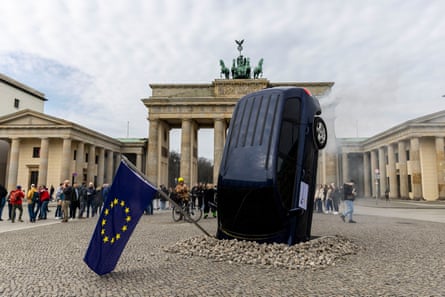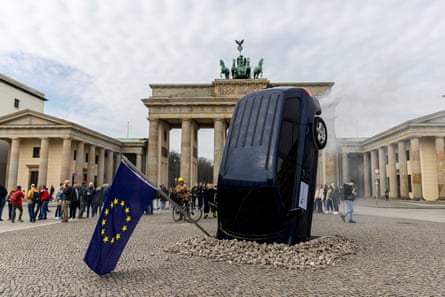Opinion
German identity doesn’t rely on cars – Brussels should face down the mighty automakers

Read more on post.
There is something rather old-fashioned about the way Germany views its car industry. When the prime minister of Bavaria, Markus Söder, calls the car the destiny of Germany and the heart of its economy, and says that “without the car, collapse is imminent”, the vehicle he seems to be describing is one with a combustion engine, running on fossil fuels or their derivatives. This nostalgic attachment to the heavy-duty, polluting industries of the 20th century is now colliding with the urgent realities of the climate crisis.
Earlier this month, heads of European automotive companies gathered in the Berlaymont building, the headquarters of the European Commission in Brussels, for a meeting with its president, Ursula von der Leyen. German car manufacturers came with two demands: to reverse the EU ban on the manufacture of new cars with CO2-emitting combustion engines that is due to come into force in 2035, and to loosen the annual quotas they have to meet for sales of electric vehicles between now and 2035.
The results of the meeting were not immediately clear. Some media reports suggested that the EU could allow hybrid cars to continue being sold after 2035. An actual decision is expected byDecember, but some dilution of the ban looks likely. The commission would “carefully assess all input received”, including “refinements” such as a continued role for some plug-in hybrid vehicles, a spokesperson told me.
The car industry’s campaign against the 2035 deadline is just one example of the backlash against EU green initiatives and legislation. Challenges from industry and agriculture have already led to the scrapping of a pesticides reduction law, the postponement of anti-deforestation regulation and the cancellation of specific reporting requirements for sectors that are most at risk of harming the environment.
Ultimately, the EU should not cave in to the German car industry. A reversal would be disastrous not only for climate goals and the environment, but for all parties involved, the manufacturers included. The German car industry accounts for about 5% of the country’s GDP but is already struggling against its global competitors, and lagging behind by nearly a decade on the required pivot to electric vehicles. Delaying the switch to zero-emissions driving will only make it less competitive.
The carmakers had done some heavy lobbying in the run-up to the Brussels meeting. Ola Kallänius, the head of the European Automobile Manufacturers Association and Mercedes-Benz, wrote an imperious open letter. Meeting vehicle carbon dioxide targets for 2030 and 2035, he wrote, “is, in today’s world, simply no longer feasible”. Targets should be done away with altogether, he argued.
The real problem, however, is that the German car industry sat back while its rivals in electric car production, Tesla and Chinese companies, aided by massive state subsidies, built the kind of expertise and reputation that is still absent in Germany.
There is some support for the car industry in the German media. Interviews with the head of the German automotive association and favourable opinion pieces in newspapers have appeared. However, this deference will not do the industry or the country any good.
The German automobile sector employs about 770,000 people, excluding suppliers. Central to their lobbying strategy is the argument that unwanted regulation will lead to job losses. But car manufacturers are already letting people go: 50,000 jobs disappeared last year, more than in any other sector in Germany. Continuing to make combustion-engine models would not staunch job losses in the long run, or even postpone them. The rationale is obvious: these are businesses interested in profits; they are not a public good. The families who own major stakes in Volkswagen and BMW – the Piëchs and the Porsches, the Klattens and the Quandts – are among the wealthiest people in Germany.

The outsized role the car industry plays in Germany’s economy and its national identity means these companies get a disproportionate amount of space in which to air their demands. A few days before the Brussels meeting, the chancellor, Friedrich Merz, showed up at the annual international automotive exhibition in Munich. He stood in front of a microphone in a brightly lit hall, using the industry’s argot to signal to the company bosses that he was hearing them: “We do not want a restriction on a single solution, we want competition of the best ideas and the best technologies.” But what Merz was arguing for would thwart the evolution that is required if the German car industry is to have a future at all.
“The future is electric,” von der Leyen said in her state of the union address two days before meeting the car manufacturers. This is not just an empty slogan. In August 2025, registration of new electric vehicles in Germany went up by 46% year-on-year. The industry itself is not united on the topic. On the day of Merz’s speech, an open letter signed by 150 companies in the EV sector called on the commission president to “hold firm” on the 2035 ban on new combustion engines. Gernot Döllner, head of German carmaker Audi, called the renewed questioning of the phase-out “counterproductive”.
after newsletter promotion
The car giants often get their own way. In May, the European Commission loosened its rule on the proportion of climate-neutral vehicles in any new fleet, extending manufacturers’ deadlines to meet their targets by two years. This appears to have saved many companies from having to pay painful fines – with the exception of Mercedes-Benz, which is likely to be the only EU carmaker to miss its emission targets. This is the company headed by Kallänius, who so strongly argued against the targets.
The 2015 diesel scandal – in which companies such as Volkswagen manipulated software to make their cars seem cleaner – has shown what the industry is capable of. Yet even when it was misleading the German government and harming the “Made in Germany” brand in the process, it did not fear any backlash. Indeed, the manufacturers are granted millions of euros in subsidies for research every year, on things such as driverless cars: BMW alone reported receiving at least €36m from Germany and the EU in 2024.
Sticking to the 2035 plan and switching to cleaner fuels is especially important, given the wider green backsliding. Citizens and businesses alike need stability and predictability in these economically turbulent times. But this will only come from recognising the urgent need to modernise – not from ripping up regulations and turning back the clock.
-
Tania Roettger is a journalist based in Berlin











